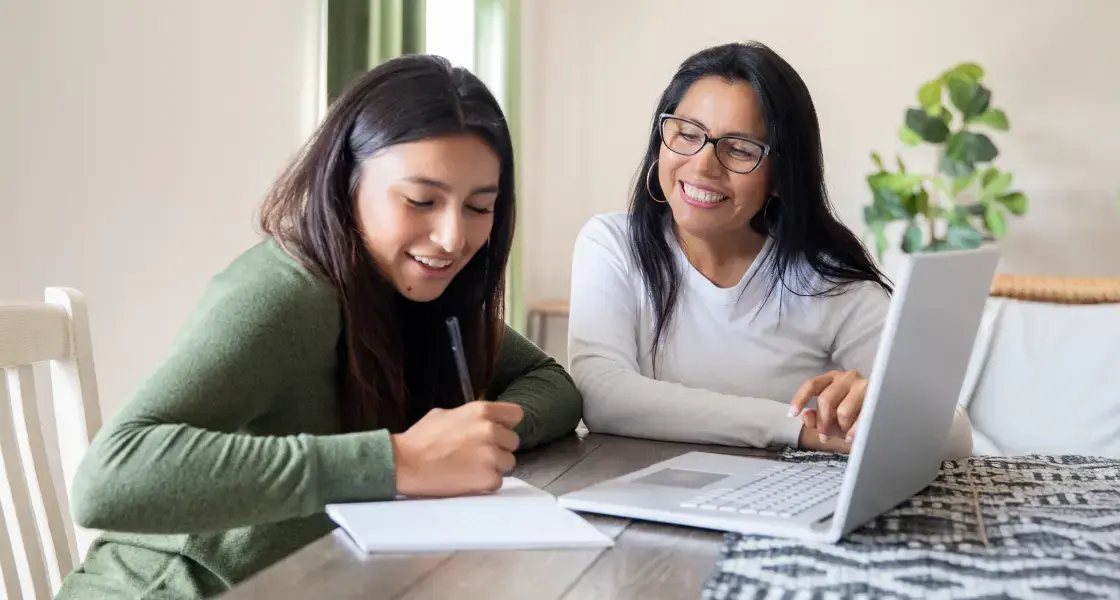What if there was a way for parents to find out what their kids are truly passionate about and then allow them to go deeper? There is. It’s known as unschooling. In this post, we’ll go over the basics, benefits, and how to get started with unschooling and online homeschool programs today.
What Is Unschooling?
Unschooling is a learning method intended to replace formal teaching with individualized learning via curiosity-driven experiences.
The idea behind unschooling is that humans are innately curious starting from birth and should therefore be given the freedom to learn what they want at their own pace without formal education and its rigid structure.
As Outschool parent Nicole Olson puts it, “Children are hardwired to learn. And we see this when babies come into the world. They’re constantly exploring and testing things and making theories and learning. When you’re interested in something, learning takes place. When something captures our fancy, we are primed to learn.”
Instead of having a set curriculum to follow, unschooled students are given a supportive setting that allows their natural curiosity to bloom. Proponents of unschooling say this curiosity develops into formal learning without formal schooling.
Olson says that learning is a side effect of playing, pursuing interests, and developing passions. "Rather than give content to children, people who practice unschooling closely observe what a child is already interested in, what they’re passionate about or what they’re playing and then bring more of that into their world. That might be through books, toys, or equipment — or it might be through connecting them with other people who share that interest.”
There are no tests, grades, or deadlines for measuring competency with unschooling. All goals are personal, decided on by the student and worked toward at their own pace. Unschooling students continue to learn naturally through interactions in their daily lives.
Why Unschooling?
- Unschooling is how entrepreneurs learn — just look at Mark Zuckerberg or Steve Jobs, who both dropped out of college in pursuit of their own paths that led to great success. Where schools prepare students to follow instructions, as all good employees should, entrepreneurs take charge of what they need to learn and make the decisions on how to get there by themselves.
- Unschooling is natural — At some point, we go from young children who can name every dinosaur and details of their diet and habitat or kids that spend hours after school painting and drawing to school-hating, test-failing pre-teens, teens, and adults. Why does this happen? Why do we stop being so curious about the world and unrelentingly pursuing answers to our questions? With unschooling, children never have to lose that curiosity and voracious appetite for learning more and more about things they’re passionate about.
- Unschooling = freedom — For people who enjoy having decisions being made for them, the structure of the traditional school is great. But, for those who like to make their our own decisions, the freedom of unschooling is unparalleled.
- Parents learn with the kiddos — In traditional school settings, parents are removed to at least some degree during their child’s learning process — yes, this is why it’s so hard to remember what the Pythagorean theorem is when your kid is [also] stumped on their homework. Unschooling allows parents to learn with their kids.
- Unschooled learning is unlimited — At school, learning is generally limited to in-school hours and homework time. Once the homework is done, kids are free to stop with the “boring learning” that they’re forced to do all day long. Unschoolers, on the other hand, learn that learning happens everywhere, all day — no matter what they’re doing. Unschoolers get to learn from traveling, playing games, getting out in nature, talking to strangers, fixing things around the house, cooking dinner, and more. Learning is all around them — and it’s fun.
The Spectrum of Unschooling
Olson says it’s important to remember that all unschoolers don’t fall into one neat category. It’s more of a spectrum — on one side, it’s similar to the more relaxed homeschooling environment. On the other side, there is “radical unschooling,” also referred to as free-range parenting, where kids are free to make their own choices in all aspects of life, including what they eat, where they go, how much screen time they can have, when they go to bed, and more.
FIRST MONTH FREE!
Get support that meets kids where they are.
Learn moreHow Homeschooling Families Can Benefit from Unschooling
Estimates show about 13 percent of homeschooled students practice unschooling. These students — and their families —experience the following benefits of child-led learning:
- A safer learning environment where students are free to be themselves.
- Improved learning outcomes with teaching methods that are much more effective.
- Children are taught in a manner that aligns with their family’s values.
- A customized, tailored approach specific to each child.
- Improved family closeness.
- A flexible schedule, which leads to a family-centered lifestyle.
- Increased passion and eagerness for learning.
These benefits have a bigger impact than you may realize. Research has found that up to 40 percent of students experience test anxiety. This enhanced academic stress can cause depression, sleep disturbances and even substance abuse. With the freedom not to worry about formal tests in unschooling, students are far less likely to experience these troubling effects.
Here are some unique benefits that Olson's children got to experience thanks to unschooling:
- Her son Thomas created a popular fan page for Taylor Swift, which eventually led him to earn an invite to a private meet and greet with the musician.
- Her daughter Katy launched her own pet care business and has earned more than $2,000 so far.
- Katy’s twin sister, Faith, launched their town’s first-ever Christmas tree lighting, which still runs to this day.
- Her daughter, Maggie, created her own science curriculum. She even led her dad through the curriculum — he’s currently reached 4th grade.
Want to jumpstart your homeschool curriculum? Download the Outschool e-book here.
Getting Started With Unschooling
If you’re ready to leap into the freedom of unschooling, you’re likely wondering where to start. The way kids learn is largely determined by their learning styles and personality types. In a conventional classroom setting, personality, and learning type aren’t usually considered when the instructor is teaching to 20 or 30+ kids at once.
Unschooling facilitates individualized learning by giving students the freedom to make their own choices about what they learn and how. As a parent, your only role is to provide your kids with an environment that encourages their natural curiosity and nurtures their learning style.
Since unschooling does not use traditional textbooks — unless the child requests one — learners can choose from any of the following methods to discover new information:
- Books they have chosen to read
- People they have chosen to speak to, including parents, friends and other family members
- Places they choose to visit, such as museums or job shadowing in formal work settings
- Interactions with nature
- Interactions with the world around them
To help your kids get started on their unschooling journey, there are some things you can do:
- Expose them to a broad spectrum of stimuli, from books lying around the house to watching documentaries, the news, Jeopardy and so on; play old board games; explore your city, state, and country; and find things together on the Internet. The exposure helps them find new interests and explore them further.
- Be patient. Remember, this is an entire process of unlearning traditional educational norms and giving the kids free rein to take over. So, don’t expect your kids to be loving school or spewing facts as fast as Einstein after the first few weeks — or even months.
- Trust. As hard as it is, especially in the beginning, you must trust the process of unschooling as well as your children. Trust that they are capable of learning on their own with minimal oversight and guidance. Trust that when they’re interested in something, they’ll take it upon themselves to learn more.
How Outschool Can Help
Outschool is your go-to resource for unschooling and online homeschool programs. Whether your child is passionate about foreign languages or computer coding and anime, we’ve got a course for them. Outschool makes it easy with more than 140,000 affordable online classes to supplement your Unschooling homeschooling program. They can dig into a variety of subjects including:
If you’re ready to set learning free for your kids, try letting them lead. Find the perfect interest-based classes your kids will love to explore. (Or request free curriculum planning help.) Whatever they’re into, whatever they want to learn, you’ll find it here. Get started today!






.svg)
.svg)







